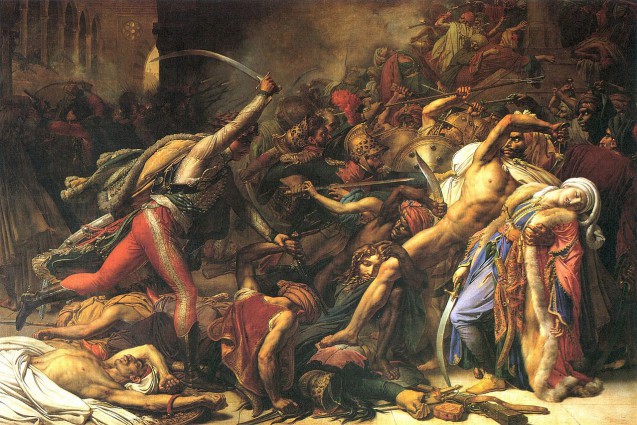The myth of the ‘glorious’ campaign in Egypt began to take root before Bonaparte had even left the country, and continued to develop thereafter. This myth however, does not ring true when we examine the hard facts. Though the expedition got off on the right foot, what came to pass afterwards was distinctly less successful, and ultimately the campaign ended in defeat.
Admittedly, the French occupied Alexandria with little resistance on 1 July 1798, crushed the Mameluke army at the foot of the Pyramids, and occupied Cairo on 23 July before easily conquering the rest of Upper Egypt. However, these early successes were quickly overshadowed by a significant disaster. On 1 August 1798, in the harbour of Aboukir, the British Admiral Nelson launched an attack, and sank most of the French fleet. Thus, Bonaparte and his army (known as the “Armée d’Orient”, the “Army of the Orient”), having taken control, were effectively prisoners of their own conquest. At the same time, the Ottoman Empire – upon which Egypt depended – declared war upon France, and launched attacks against French troops. To make matters worse, Bonaparte had to suppress the bloody revolt by the population of Cairo from 21-22 October, which started a cycle of revolts and repression, guerrilla attacks and counter-guerrilla attacks, with massacres on one side, and executions on the other. It was weeks before Egypt managed to regain a sense of relative calm.
Having finally established order, Bonaparte was able once more to devote himself to “classical” warfare. He left Cairo on 10 February 1799, and confronted the Turks in Palestine. He defeated them at El-Arich, Gaza, Jaffa and at Mount Tabor. However, he did not attempt to occupy Jerusalem, as he did not want to be associated with the Crusaders by a population who were already up in arms against the “infidels”.
Finally, the “Armée d’Orient”, came up short at Acre. After many fruitless assaults, Bonaparte was forced to lift the siege on 17 May 1799, and to turn back towards Cairo. And to make matters worse, an epidemic of plague, which had until then been contained, erupted at Jaffa. The General-in-Chief arrived in the town on 24 May. He continued his withdrawal, leaving behind dozens of troops who had fallen victim to the disease, an episode for which he would continue to be criticised for in the years to come. He arrived in the Egyptian capital on 14 June.
A Turkish army had disembarked not far from the Nile Delta. Bonaparte met with them, and defeated them on 25 July 1799, in a battle which the French call – in order to forget the naval disaster – “bataille terrestre d’Aboukir” (“the land battle of Aboukir”). The ‘Napoleonic’ part of the campaign in Egypt was about to come to an end. The General-in-Chief had heard that events were accelerating in France, and that the “Directors” were in great difficulty. As he would later say, “the pear was ripe for picking”, and so he decided to return to Paris to seize the opportunity. On 23 August, leaving Kléber in command, he embarked and miraculously avoided the British naval patrol. He stopped off in Corsica, before disembarking at Saint-Raphaël (South-Eastern France) on 9 October. He proceeded to the capital, cheered on by the crowds. On 9-10 November 1799, the coup d’état was a success. Napoleon Bonaparte became Consul, and then First Consul of the Republic.
Meanwhile, on the other side of the Mediterranean, the story of the “Armée d’Orient” continued to unfold. Kléber suppressed a second revolt in Cairo and was successful in defeating the Turks at the Battle of Heliopolis. He was assassinated by a fanatic on 14 June 1800, the same day that First Consul Bonaparte defeated the Austrians at the Battle of Marengo in Italy. Kléber was succeeded by General Menou. However, the new General could not save the campaign, and he was forced to surrender on 31 August 1801. The army was repatriated to France aboard British ships, according to the terms of the surrender.
Thus, the Egyptian expedition ended in defeat. Despite an initial military victory, the French army was forced to surrender. From a diplomatic point of view, the war with Turkey had complicated the situation: the rupture of the traditional alliance between France and Turkey had robbed the Republic of a well-placed ally against Austria, Russia and Britain.
However, despite the disappointing historical reality, Egypt would go on to take a special place in the Napoleonic legend.
Bullet Point #5 – Was the Egyptian Campaign one of Napoleon’s great successes?
Author(s) : LENTZ Thierry
Each “Bullet Point” will confront a question related to the First Empire. My remarks are designed to form the basis for debate and, I hope, research.
(Thierry Lentz, March 2018, English translation by Jenny Spencer with Rebecca Young)


